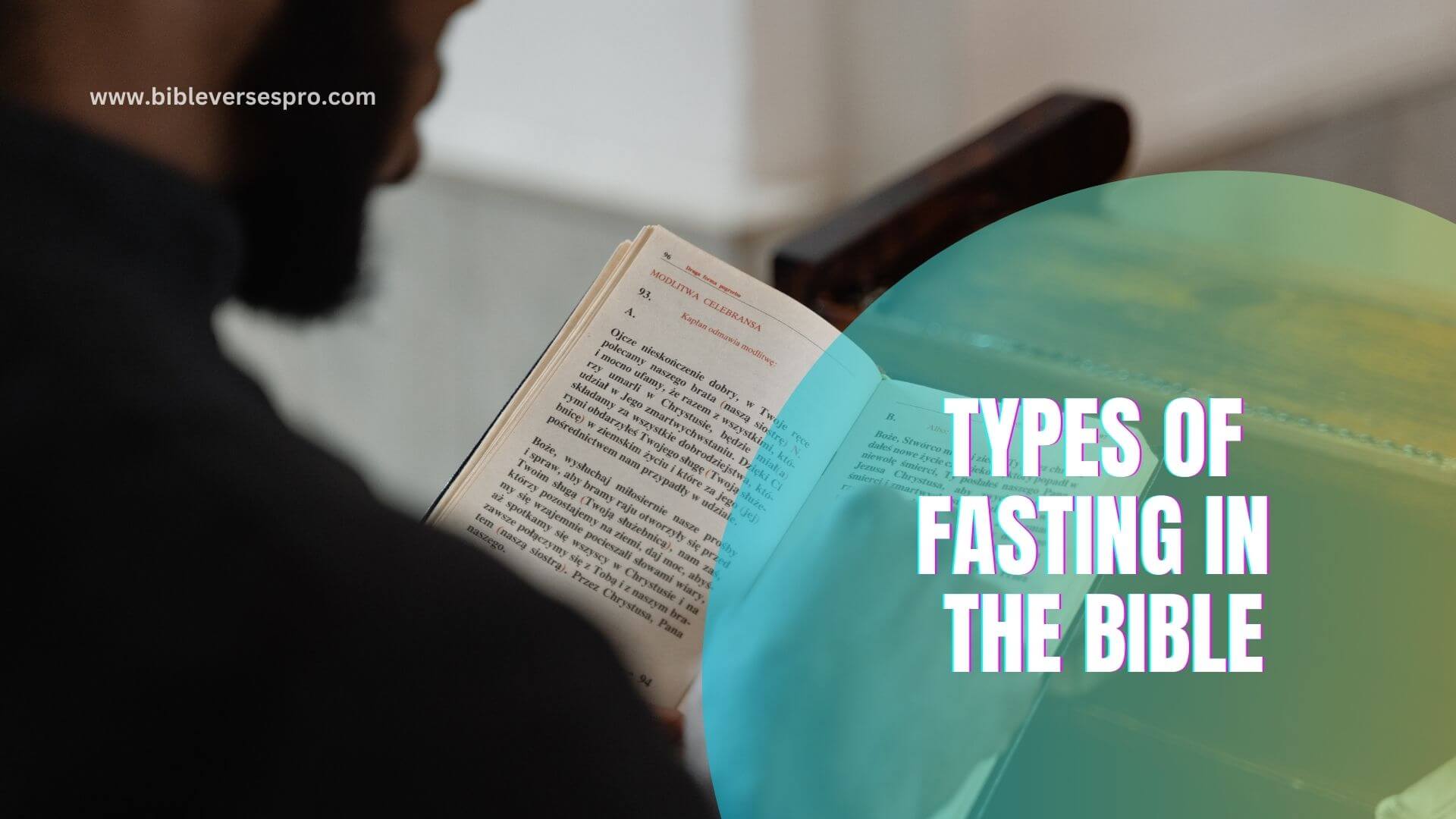Fasting has been a spiritual practice since ancient times and is also mentioned numerous times in the Bible.
In the Old Testament, people fasted as a sign of mourning, repentance, and humility before God. In the New Testament, Jesus fasted for 40 days in the wilderness before beginning his public ministry.
Fasting is also mentioned in the apostles’ teachings, who recommended it as a spiritual discipline to help believers draw closer to God. In the book of Acts, we see examples of early Christians fasting and praying for guidance and direction from God.
In this article, we will explore the types of fasting and its importance as a spiritual practice for Christians today. We will also discuss the different types of fasting in the Bible and provide practical tips for incorporating fasting into our spiritual lives.
Types of Fasting in the Bible
In the Bible, people and groups undertook several different sorts of fasting to get closer to God and discover His plan.
Understanding the specifics of each style of fasting can help us strengthen our spiritual connection with God.
This article will examine the various types of fasting mentioned in the Bible, their meanings, biblical illustrations, and spiritual implications.
1. Absolute or Full Fast
An absolute or complete fast is where you abstain from food and water. This type of fast is also known as a dry fast and is one of the most challenging fasts.
Biblical Examples
In the Bible, there are several examples of absolute or complete fasts.
- One such example is the Book of Esther, where Queen Esther and the Jews of Susa fasted for three days and nights without food or water, seeking God’s intervention to save their people from destruction.
- Another example is the book of Acts, where the apostle Paul went on an absolute fast for three days after encountering Jesus on the road to Damascus.
Benefits and spiritual significance
An absolute or full fast can have several physical and spiritual benefits. Physically, it allows the body to detoxify and reset, improving digestion and overall health.
Spiritually, it allows us to focus solely on God and seek His will without any distractions. It also symbolizes our complete dependence on God, recognizing that He is the source of our sustenance and strength.
2. Partial Fast
A partial fast is a type of fast where you abstain from certain types of food or drinks or limit your intake of them. There are different types of partial fasts, including:
- Daniel Fast: where you only eat fruits, vegetables, and whole grains and abstain from meat, dairy, sugar, and processed foods.
- Juice Fast: only drinking fruit or vegetable juices and abstaining from solid food.
- Liquid Fast: You only drink water or other liquids and abstain from solid food and juice.
Biblical Examples
In the Bible, there are several examples of partial fasts.
- One such example is in Daniel’s book, where Daniel and his friends abstained from eating the king’s food and wine and instead ate only vegetables and water for ten days.
- Another example is Joel’s book, where the prophet called for a national day of fasting and instructed the people to abstain from food and drink.
Benefits and spiritual significance
A partial fast can have several physical and spiritual benefits. Physically, it can help improve digestion, detoxify the body, and promote weight loss.
Spiritually, it allows us to focus on God and rely on His strength and provision. It also serves as a reminder of our need for self-discipline and obedience to God’s commands.
3. Intermittent Fast
Intermittent fasting is a type of fast that alternates periods of eating with periods of fasting.
There are different methods of intermittent fastings, such as the 16/8 method (fasting for 16 hours and eating within an 8-hour window) or the 5:2 method (generally eating for five days and restricting calorie intake for two days).
Biblical Examples
While the Bible doesn’t specifically mention intermittent fasting, there are examples of people fasting for extended periods.
- For example, Moses fasted for 40 days and nights while he was on Mount Sinai receiving the Ten Commandments (Exodus 34:28), and
- Jesus also fasted for 40 days and nights in the wilderness before beginning His public ministry (Matthew 4:2).
Benefits And Spiritual Significance
Intermittent fasting can have several physical and spiritual benefits. Physically, it can help improve insulin sensitivity, regulate blood sugar levels, and promote weight loss.
Spiritually, it can help us cultivate self-control, discipline, and dependence on God. It can also remind us to prioritize our spiritual health over physical desires.
Biblical Rules for Fasting
Having a clear purpose in mind is essential, which helps us stay focused and intentional in our fasting.
Throughout the Bible, we see examples of purposeful fastings, such as when Daniel fasted to seek understanding from God (Daniel 9:3) or when the apostles fasted to discern God’s will (Acts 13:2-3).
1. Fasting with a Humble Attitude
Fasting is not meant to be a way to show off our piety or to feel superior to others. Instead, we are called to approach fasting humbly, recognizing our weaknesses and our need for God’s grace.
Jesus warned against fasting for show or the praise of others (Matthew 6:16-18) and instead encouraged us to fast in secret, knowing that God sees and rewards what is done in secret (Matthew 6:18).
2. Fasting with Discipline and Self-Control
Fasting requires discipline and self-control, as we deny ourselves the pleasure of food or other comforts.
Through fasting, we learn to exercise self-control in other areas of our lives, such as in our speech or actions. Biblical examples of disciplined fasting include when Jesus fasted for 40 days in the wilderness (Matthew 4:2) or when Paul fasted and prayed for the believers in Corinth (2 Corinthians 6:5).
3. Fasting with a Generous Heart
Fasting can be combined with acts of charity and generosity, as we use the time and resources we save through fasting to help others in need.
The prophet Isaiah described this kind of fasting as loosening the chains of injustice, setting the oppressed free, and sharing food with the hungry (Isaiah 58:6-7).
4. Fasting with Perseverance and Endurance
Fasting can be challenging, both physically and emotionally. But as we persevere through the difficulties, we can experience growth and transformation.
In the Bible, we see examples of people who persevered in fasting despite significant obstacles, such as when Esther and the Jews fasted for three days in preparation for her meeting with the king (Esther 4:16) or when Elijah fasted for 40 days as he journeyed to Mount Horeb (1 King 19:8).
5. Fasting with Faith and Trust in God
Finally, fasting is an act of faith and trust in God. We trust that God will provide for our needs and guide us through the challenges of fasting.
Jesus taught his disciples that some things could only be accomplished through prayer and fasting (Matthew 17:21), so we fast with the expectation that God will work in and through us as we seek him in prayer.
What Type of Fasting Pleases God?
God’s Perspective on Fasting
Regarding what type of fasting pleases God, it’s essential to understand God’s perspective on fasting.
Firstly, fasting is not a way to earn God’s favor or manipulate Him into doing something. Instead, fasting should be done with the right motives and intentions to draw closer to God and align oneself with His will.
In the Bible, there are several examples of fasting that please God, such as when King Jehoshaphat called for a fast throughout Judah to seek God’s help in battle (2 Chronicles 20:3-4), when Ezra fasted and prayed for protection during a journey (Ezra 8:21-23), and when the prophetess Anna fasted and prayed for the redemption of Jerusalem (Luke 2:36-38).
It’s important to note that the type of fast isn’t as significant as the heart and intention behind it. God desires a genuine and humble heart that seeks Him with all sincerity, regardless of the type of fast. Therefore, any fast can please God if it’s done with the right motives and intentions.
Practical Ways to Please God Through Fasting
In addition to understanding God’s perspective on fasting and the types of fasting that please Him, there are also practical ways to please God through fasting.
Cultivating a sincere heart and attitude
The first and most important way is to cultivate a sincere heart and attitude. This means approaching fasting with humility, repentance, and a desire to draw closer to God.
It also means being honest about the reasons for fasting and being willing to submit to God’s will and guidance.
Implementing Biblical Rules and Guidelines for Fasting
Implementing biblical rules and guidelines for fasting is also essential in pleasing God. This includes having a purpose for fasting, seeking God’s guidance, and setting aside dedicated time for prayer and reflection.
It also includes following the appropriate type of fast for one’s circumstances and physical abilities and breaking the prompt correctly.
In addition to these practical steps, fasting should be accompanied by other spiritual practices, such as prayer, Bible study, and worship. These practices help to deepen one’s relationship with God and reinforce the purpose and intention behind fasting.
Conclusion
The Bible has many instances of various types of fasting, such as complete or absolute fasts, partial fasts, and intermittent fasts.
These fasting may have spiritual significance and advantages, including a closer relationship with God, increased insight and clarity, and emotional and physical healing.
However, it is crucial to fast with purpose and meaning according to biblical fasting regulations, including seeking God’s will and acting humbly and sincerely.
By doing this, we can strengthen our relationship with God and please Him via fasting.







